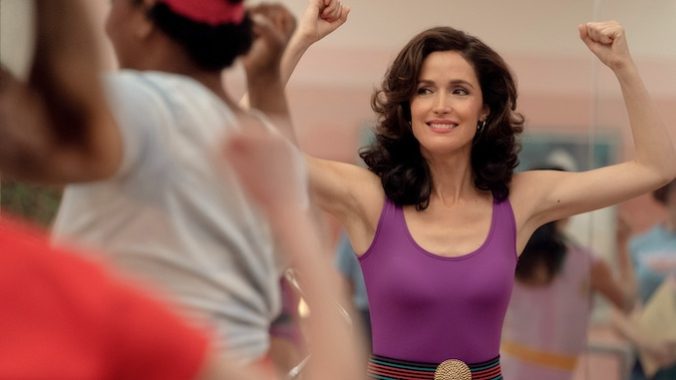Apple TV+’s Physical Season 3 Remains Brilliant, Even If It Stumbles Towards the Finish Line
Photo Courtesy of Apple TV+
It may be a case of running in the wrong circles, but ever since watching the first season of Physical, the excellent “comedy” about a lost and troubled woman who discovers aerobics and capitalism at the same time and transforms her life, I’ve considered it one of the most underrated great shows… well, maybe ever. I could count on one hand the number of times I’ve heard it discussed in the wider world when I wasn’t the one initiating the conversation, and I talk about TV a lot.
The question of why is hard to answer; a fractured streaming landscape? Difficult subject matter (eating disorders and sexual abuse are among the themes the show confronts)? Bad luck? In any case, Rose Byrne’s performance as Sheila Rubin is somewhere beyond superb, and if it’s true that Physical never quite found the audience it deserved, maybe the chorus of voices singing its praises will give it a kind of steady afterlife. The people who like this show really, really like it.
The bad news, as we arrive at the premiere of Season 3, is that after a stunning second season which somehow upped the quality of the first and included some of the hardest emotional gut punches I can remember in recent television, the third season represents a step down. Byrne and her supporting cast are just as good, and the high points echo the peaks of the first two seasons, but in general, the writing suffered a dramatic drop-off. It’s hard not to see that as a result of the push to a conclusion; through two seasons, this show was almost bold in its pacing, displaying a kind of swagger in the measured plot beats that brought us where we needed to be with absolutely no haste. It takes an extreme kind of confidence to pull that off without any prior reputation, but here, with the finish line in sight, it’s clear that there was some urgency to go a little faster, do a little more.
Unfortunately, that did no favors to the narrative. Without spoiling anything, suffice it to say that several decisions by the characters lacked the emotional roots that tethered them so strongly to reality over the first 20 episodes. Dierdre Friel’s Greta Hauser gets particularly short shrift here, and her husband Ernie (Ian Gomez) suffers the same fate, which is a shame because it can’t have been easy to build them into a complex couple to this point. As for John Breem (Paul Sparks), the Mormon hyper-capitalist, and his wife Maria (Erin Pineda), they undergo a strange marital dispute at the start that almost plays like a non-sequitur, and then, instead of resolution, they’re given a quick escape hatch that makes so little sense for their characters. Sheila Rubin herself falls prey to this same device later, with a conclusion so tacked on and speedy that it’s impossible to imagine how any of the writers could possibly think it was an effective wrap-up.
On those merits, the third season doesn’t belong in the same echelon as the first two, and the hardcore fans will likely see it as a sort of Godfather 3, where it’s included among the greater franchise only with the cautionary accompaniment of several strong disclaimers. Still, to call the season a total failure would be unfair and wrong.
-

-

-

-

-

-

-

-

-

-

-

-

-

-

-

-

-

-

-

-

-

-

-

-

-

-

-

-

-

-

-

-

-

-

-

-

-

-

-

-








































